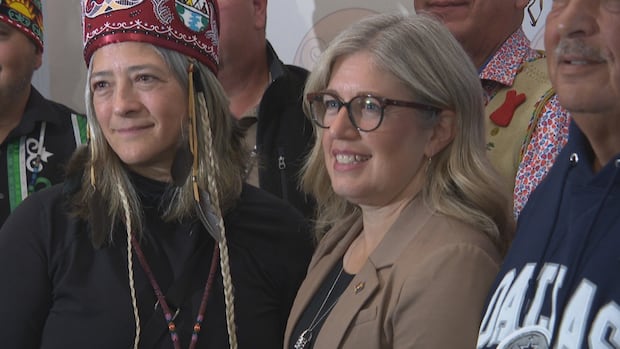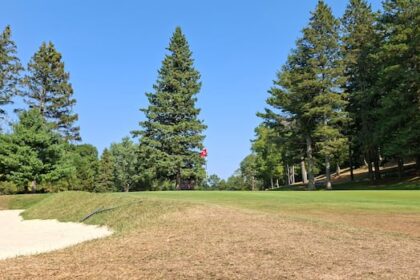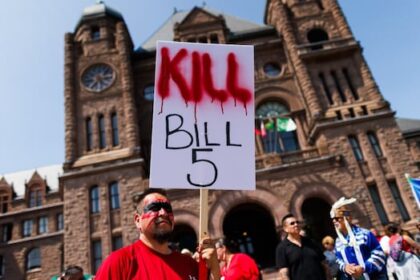New BrunswickPremier Susan Holt promised during last fall’s election that she would negotiate new tax-sharing agreements with First Nations, after the previous agreements were cancelled by the Blaine Higgs government. After nine months of negotiations, the new deals are in place.New agreements are similar to deals cancelled by the Higgs government in 2021Silas Brown · CBC News · Posted: Sep 25, 2025 3:49 PM EDT | Last Updated: 3 hours agoMadawaska chief Patricia Bernard (left) and premier Susan Holt (right) pose for a picture following the announcement of new tax sharing agreements in Fredericton on September 25, 2025. (Mikael Mayer / Radio-Canada)Fourteen First Nations in New Brunswick scored a major win Thursday, signing new tax-sharing agreements four years after the original agreements were unilaterally cancelled by the provincial government. The communities needed the revenue to provide services, said Chief Gabriel Atwin of Bilijk First Nation.”It’s critical that First Nations communities have their own-source revenue,” he said at an event in Fredericton. “There’s a lot of infrastructure, youth activity, seniors … that we need revenue to be able to support.”Chief Terry Richardson of Pabineau First Nation says the new deals won’t just benefit First Nations but the province as a whole. (Jacques Poitras/CBC)The new deals are modelled after the previous ones, which were cancelled by former premier Blaine Higgs in April 2021. The two deals were announced at events in Fredericton and Metepenagiag First Nation and differ slightly from one another.Wolastoqey First Nations will keep 95 per cent of the first $10 million of tax revenue generated from tobacco, gas and the provincial portion of HST on their reserve lands. They will keep 70 per cent of revenues between $10 million and $16 million and anything above that will be split evenly with the province. All six Wolastoqey First Nations signed on to the agreement.WATCH | ‘We’re sharing’: Chiefs welcome new revenue-sharing agreements: Holt government and First Nations sign new tax-sharing agreementsThe Higgs government announced in 2021 that it would cancel the existing agreements, which First Nations leaders said helped fund essential community services. Now new deals have been struck.The Mi’kmaw agreement is the same, except communities will keep 70 per cent of amounts between $10 million and $18 million. Eight of the nine Mi’kmaq First Nations signed the deal, with Elsipogtog left out of the news release from the provincial government.According to Premier Susan Holt, it’s expected the province will take a $50 million hit in the first year of the agreement, but Madawaska Chief Patricia Bernard said that it shouldn’t be seen as a loss.”The province is not giving First Nations money,” she said. “We’re sharing. These monies are generated within our communities, our jurisdiction and the paradigm shift could easily say we are sharing with the province.”It’s very important to sort of change that thinking [that] the province is handing out or losing money. No, the province is going to make money off of our prosperity.”Former premier Blaine Higgs speaking with reporters after announcing the government would cancel the longstanding tax agreements on April 13, 2021. (CBC News)The original agreements were signed in 1994 and helped fuel economic growth in some First Nations, particularly those who were able to build large gas retail businesses in prime locations near highways. They saw 95 per cent of retail tax revenue go to First Nations up to $8 million, and 70 per cent of amounts beyond that.When cancelling the agreements in 2021, Higgs called the deals “unsustainable and unfair” and said they created “a two-tier tax system” that undercut the province’s ability to fund schools and hospitals. Instead, Higgs wanted to sign funding agreements with individual First Nations. At least five First Nations took him up on the offer. Holt promised during last year’s election that she would sign new tax-sharing agreements and, after nine months of negotiations, announced the new pacts at events with Wolastoqey representatives in Fredericton and Mi’kmaq in Metepenagiag. The cash generated by the previous agreements went to a variety of different services, depending on the community, often funding youth programs, supporting elders and building housing.Chief Terry Richardson of Pabineau First Nation said the loss of that revenue made the last few years difficult. “It’s meant us being in a very rough situation, not being able to address the shortfalls in funding that we had,” he said. “And every dollar we spend is spent in this province of New Brunswick. First Nations don’t have offshore bank accounts. We keep our money here.”Chief Gabriel Atwin of Bilijk First Nation welcomed the new agreements and said communities rely on the revenue to provide services they couldn’t otherwise afford. (Chad Ingraham / CBC)In Fredericton, Sitansisk Chief Alan Polchies blamed the closure of the S. Mary’s Supermarket on the loss of tax-deal revenue, saying that without it, the store lost millions a year.Both Holt and the Wolastoqey chiefs struck an upbeat tone, calling the new agreement the first step in further co-operation after the often tense relationship that characterized Higgs’s years as premier.Holt confirmed there have been discussions about sharing some of the cash generated by the natural resource extraction industry and said this deal will serve as a starting point for future talks. “Figuring out a path forward comes through doing work like this, setting the table, listening, coming to that table with respect and prepared to build trust and work through hard things,” Holt said. “We’ve learned a lot along the way about each other, and I think we’ve created the foundation to move forward to the next conversation.”The deal may have implications for the future of a Wolastoqey title claim to about 60 per cent of the landmass of the province. The Aboriginal title claim was filed not long after the tax agreements were cancelled, and it is making its way through the courts. Holt said during the election that the ideal way to deal with the issue was to negotiate rather than rely on litigation. Bernard wouldn’t say what the future of that claim is, but also expressed the sentiment that the tax agreement had helped reopen the lines of communication with the government following the strained relationship of the Higgs years. “These agreements set the basis, this is the starting line for future relationship building,” she said.”We’re not done, this isn’t over, this relationship will continue and it’s just starting off in a positive way.”Eight Mi’kmaq First Nations also filed a title claim for a large swath of the province, but according to Richardson that litigation is on hold. ABOUT THE AUTHORSilas Brown is a Fredericton-based video journalist. You can reach him at silas.brown@cbc.ca.
New Brunswick, First Nations sign new tax-sharing agreements











